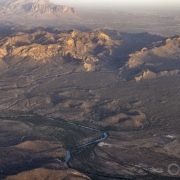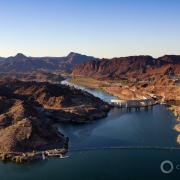Binational Commission Calls For Public Trust Framework For Great Lakes
States and provinces have made significant strides to prevent diversions of Great Lakes water, but more should be done, report finds.

Photo © J. Carl Ganter / Circle of Blue
For the eight states and two provinces that share their waters, the Great Lakes form the center of the region’s economy, culture, and identity in all seasons. Laws to protect the lakes are stronger than before, but not strong enough, according to a new report.
By Codi Kozacek
Circle of Blue
In a resounding endorsement of applying public trust principles to limit contemporary threats to the Great Lakes, the International Joint Commission recommended in its newest report that U.S. and Canadian authorities embrace the ancient legal doctrine as a powerful tool for overseeing the lakes’ safety.
The public trust doctrine is a legal concept with roots stretching back to the Roman Empire. The doctrine asserts that certain natural resources—and water in particular—are of such exceptional value to society that they should be held in common and protected for the benefit of all. Applying public trust principles as a more powerful safeguard for natural resources is championed in the Great Lakes region by attorney Jim Olson, the founder of the Traverse City, Michigan-based environmental law group For Love of Water (FLOW).
The idea of applying public trust principles to managing the Great Lakes comes after eight U.S. states approved the Great Lakes Compact, which strictly limits transfers and diversions of water outside of the Great Lakes Basin. Congress finalized the Compact in 2008, following the passage in 2005 of a similar pact, the Great Lakes-St. Lawrence River Basin Sustainable Water Resources Agreement, between the states and the Canadian provinces of Ontario and Quebec.
According to the newest report by the International Joint Commission, released last month, the two agreements “provide a great degree of protection for the waters of the Basin and are likely to serve the people of the Basin well in the decades to come.”
But the IJC report also noted that the Compact is not bulletproof, urging a series of changes to strengthen both the agreement itself and its implementation. Most notable is a recommendation to adopt a public trust framework to serve as a “backstop” to the Compact and guard against unforeseen threats to Great Lakes water. The effect of the joint commission’s recommendation is to elevate public trust principles to a much higher level of legal attention and regulatory priority than the doctrine has ever held in the Great Lakes region.
“The Compact is a very praise-worthy agreement. It is quite a momentous achievement,” Dave Dempsey, policy advisor for the IJC in Washington, D.C., told Circle of Blue. “But one cannot assume that the Compact will endure forever. It was approved by Congress, and it can be repealed by Congress. If the political balance in the U.S. changes, and obviously it has already started to change with more power going to the Southwest, the Compact could become vulnerable. I don’t see that happening in the near future, but in that case, public trust common law would provide very strong protection against shipments of water out of the basin. The states need to be mindful of the doctrine and be willing to apply it at appropriate times.”
Public Trust in the U.S.
In the United States, the public trust doctrine is commonly incorporated into state constitutions and laws, and charges the state to protect exceptional natural resources for recreation, cultural purposes, environmental services, and the general public good. But the doctrine’s primacy is most often subjugated to state and federal environmental statutes, most of which have not been updated to respond to new conditions, or are weakly enforced. By declaring resources a public commons subject to the public trust, users of resources would have to show their activities cause no harm or be subject to court suit and regulatory action.
The public trust doctrine already exists in some form within the Compact, which declares that “the waters of the Basin are precious public natural resources shared and held in trust by the States.” But state implementation of the provision varies widely. For example, Wisconsin maintains that the provision cannot be used to expand the public trust doctrine beyond the rights that exist under state law, according to David Strifling, director of the Water Law and Policy Initiative at Marquette University Law School.
“My understanding of what the [IJC] report is challenging or charging us to do is to recognize some kind of separate Compact trust that goes above and beyond the individual state requirements,” Strifling told Circle of Blue. “I think the mechanism for that is a little unclear.”
It could be difficult to standardize the public trust doctrine across states without another overarching agreement, which would itself be a significant challenge to achieve. Official negotiations over the Compact lasted years, not to mention the decades of work it took to build momentum for the Compact in the first place. Another option, however, could be to implement a broader interpretation of the public trust provision already in the Compact, Strifling said. That might mean applying it to different categories of water, such as groundwater or wetlands, rather than limiting it to navigable waters as some states have. Other states across the country have already made strides to expand interpretations of their own public trust laws. For example, Washington state has used the public trust to justify climate change action.
“It wouldn’t be unheard of to expand it substantially,” Strifling said. “But in Wisconsin, frankly, the trend has been going in the other direction.”
Expanding the public trust through the existing Compact could also raise significant legal questions for the states. For example, if a state were to decide that the public trust did not apply to a situation under its own laws, but that it did apply under the Compact, it could be unclear which law took precedent. And if a legal challenge were to arise from the conflict, the states would also have to decide whether to resolve it in state courts or some kind of separate tribunal, Strifling said.
Jim Olson, the FLOW attorney, argues that the public trust doctrine is so powerful, and simple to apply, that its legal principle of “do no harm” should eventually supersede environmental statutes as the basis for overseeing natural resources.
Waukesha Decision First Test for Compact
Inconsistency in the implementation of the Compact’s current provisions is one of the factors that Great Lakes advocates are watching closely.
“We’ve seen the passage of the Great Lakes Compact by all the Great Lakes states and Congress. Those are all really positive developments,” Joel Brammeier, president and CEO of the Chicago-based Alliance for the Great Lakes, told Circle of Blue. “But the promise of the Compact is really in the implementation, and the jury is still out on that.”
The Compact’s first big test is a request by the city of Waukesha, Wisconsin to divert Lake Michigan water for its municipal supplies. The city is outside of the Great Lakes Basin itself, but is located in a county that straddles the divide between the Great Lakes Basin and the Mississippi River Basin. Therefore, it can apply for an exception to the Great Lakes Compact’s ban on out-of-basin water diversions as long as it meets strict requirements. Waukesha’s application has been reviewed by the Wisconsin Department of Natural Resources and passed on to the governors of the eight Great Lakes states, who must unanimously approve it. A decision is expected on the diversion request in April.
The application is already being fiercely debated. In a forum held at Marquette University Law School on February 4, John Dickert, the mayor of Racine, Wisconsin, said there was a lot of concern about “cracking the egg of the Compact” and opening the door to future water diversions. Waukesha’s mayor, Shawn Reilly, rebutted that notion and said he is confident that Waukesha meets the strict criteria for a diversion laid out in the Compact.
“If a governor were to make a political decision and say we don’t want this because there might be other applications in the future, that would make the Compact actually unsafe,” Reilly said. “It would cheapen the Compact because a state could say, we’re going to pick and choose which parts of the Compact we like and which ones we don’t.”
A news correspondent for Circle of Blue based out of Hawaii. She writes The Stream, Circle of Blue’s daily digest of international water news trends. Her interests include food security, ecology and the Great Lakes.
Contact Codi Kozacek




 © J. Carl Ganter / Circle of Blue
© J. Carl Ganter / Circle of Blue 






Leave a Reply
Want to join the discussion?Feel free to contribute!